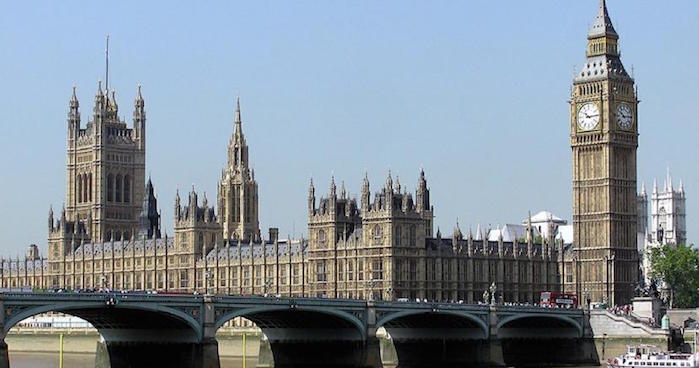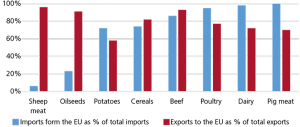The Government must agree transitional arrangements with the EU, in order to mitigate the potentially disastrous effects of leaving the union without a trade deal in place, a House of Lords committee has concluded.
In a comprehensive report on the implications of Brexit for agriculture, the Lords Energy and Environment committee warns that the Government and industry will need to overcome serious challenges, especially in the areas of trade and labour arrangements. It highlighted the pig sector as being particularly vulnerable under certain post-Brexit trade scenarios.
The EU is the UK’s single largest trading partner in agri-food products – about 80% of the UK’s agricultural exports go to the EU.
The committee, which took evidence from a wide range of experts and industry bodies, including the National Pig Association, stressed that the UK will have to develop its own tariff schedules and negotiate new trading relations with the EU and the wider world.
It concluded: “UK farmers risk facing high tariffs and significant non-tariff barriers when exporting, and competition from lower-priced imports domestically. Both tariff and non-tariff barriers could disrupt integrated supply chains between the UK and the EU, and pose a particular challenge for the agri-food sector in Northern Ireland.”
The report noted that, despite the regulatory conformity between the UK and the EU, there is broad consensus among experts, including those on the EU side, that it will not be possible to negotiate and conclude a comprehensive free trade agreement with the EU within two years.
If the UK leaves the EU without agreeing a comprehensive UK-EU Free Trade Agreement, or a form of transitional arrangement, UK-EU trade would have to proceed according to WTO rules.
“Many of our agricultural producers, and our food manufacturers, would incur substantial costs associated with tariff and non-tariff barriers when exporting to the EU, with sectors such as pig and sheep meat at particular risk,” the report concluded.
“It is therefore essential that the Government should agree transitional arrangements with the EU, in order to mitigate the potentially disastrous effects of trading on WTO terms on the agricultural and food sectors.”
Non-EU trade deal risks
The report also highlighted the risks and opportunities for the UK agricultural sector of new trade deals outside the EU.
It said: “As an EU Member State, the UK has access to preferential trade agreements with a number of third countries. We doubt that UK participation in these agreements can be preserved after Brexit.
“It is essential therefore that the Government should, as a matter of urgency, clarify whether or not such agreements could indeed be grandfathered to preserve preferential trade arrangements for agri-food products.”
The peers welcomed the Government’s commitment to maintaining high levels of animal welfare in the UK.
But the committee concluded there is ‘some doubt over whether animal welfare can be used as a rationale to restrict imports from other countries under WTO rules’.
“However, we encourage the Government to secure the inclusion of high farm animal welfare standards in any free trade agreements it negotiates after Brexit,” the report said.
It added: Our witnesses were concerned that increased trade with third countries that operate different—often less stringent—regulatory standards than the UK could render UK producers uncompetitive in the domestic market due to an influx of cheaper products produced to lower standards.
“It could also lead to increased pressure on the Government to reduce standards domestically in order to lower the cost of production and increase price competitiveness. Yet we note that UK producers are proud of their high standards, and that our witnesses questioned whether consumers would welcome such a downward trend in current standards.
“In looking to expand trade in the longer term with third countries, such as China, we also heard that high standards were crucial to the British brand. The Government should therefore maintain the current standards to enable the export of UK food and farming products.”
Labour access
The report also issued a serious warning to Government on future access to labour, reiterating the NPA’s argument that the focus must be on permanent as well as seasonal labour. Among the evidence cited to back this point was an NPA survey showing one in five farms and businesses connected to the pig industry would struggle to survive without migrant labour.
It said: “In the short term, technology cannot materially reduce the need for EU agricultural labour; nor is there sufficient local labour to address the shortfall. Unless arrangements are made to preserve access to labour from outside the UK, the agri-food industry will suffer major disruption.
“The UK agri-food supply chain employs both seasonal and permanent EU workers, so a seasonal agricultural workers scheme alone, though a priority for our witnesses, will not be a sufficient measure for preserving access to labour.”
The report urged the Government to recognised that many workers in the agricultural sector are often regarded as ‘unskilled’, but are in fact ‘extremely skilled at sector-specific’.
It said: “We recommend that the Government recognise these skills when assessing labour needs and access to foreign labour after Brexit.
“We also welcome the Minister’s recognition that continued access to EU labour should be based on an assessment of the needs of the industry, rather than a simplistic distinction between skilled and unskilled labour.”





